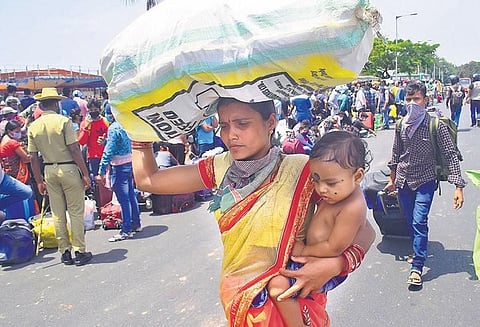

BENGALURU: Gopal got angry as he struggled to answer my simple question. Reading about migrants walking back to their native villages, I had asked him: Does he also intend returning to Bihar? After a long silence, he said, “My native place, amma?” And there followed a long, angry monologue.“Which is my native place, amma? I came to Bengaluru as a three-year-old child, with my parents, 22 years ago. I have lived here since then. Bengaluru is my home. I don’t know any other.
We were landless labourers in Bihar, but never had enough to eat. So my father moved. We have nothing in that village now, almost everyone has left or died, there is nothing, nothing. So, what ‘home’ do I return to? There are hundreds of others like me, with no earnings, where do we go? In school they taught us that we should feel proud to be Indians. Does being an Indian help me? I sank all my savings on building myself a one room house here. If I move to my village now, do I take my house with me?”
I had no answer. I used to feel sorry for the migrants I saw on TV, women with infants and pregnant women, but who focuses on the plight of others like Gopal who have lost their jobs and have nowhere to go? Does anyone care? Gopal used to be a lorry cleaner. There is no business for lorries since March. Autorickshaw driver Arun and construction worker Joseph are likewise ‘nowhere people’, not migrants. There is a scheme for distributing `5,000 to auto drivers, but Arun got nothing, thanks to procedural hassles and corruption. There are thousands like him, left in the lurch.
Although construction work has been partly resumed, Joseph has not got the relief package of `5,000 announced by the state government because he has to be registered, and for that he needs his contractor’s signature (which the contractor refuses to give as he will have to contribute to the fund for labourers under the law; Joseph’s attempts to mobilise his co-workers, only generated hostility from his employer.) This is the reality. Jaya, 54, cleans three shops. She is a Kannadiga, not a migrant.
And yet, her plight is no less than that of the migrants. The shops she worked in remained closed for three months. They didn’t pay her. Jaya’s daughter, Manju, needs dialysis twice a week, and now she cannot even afford the auto fare to the hospital. She stopped going; no one knows how long she will live. Subsequently Jaya heard that some hospitals arrange for transport for poor patients, but being illiterate she had no idea where to enquire.
A victim of the pandemic? You bet, just as much as migrant labourers. But who looks at these diverse groups of non-migrant cases? “I now wait for death, sooner the better,” says Manju.These are our ‘nowhere people’, Bharat vaasis just as much as any other citizen, but ignored. Because they have no clout, power, or money. Give it a thought as yet another Independence Day comes round and flags are hoisted.(The writer is a city-based independent journalist)